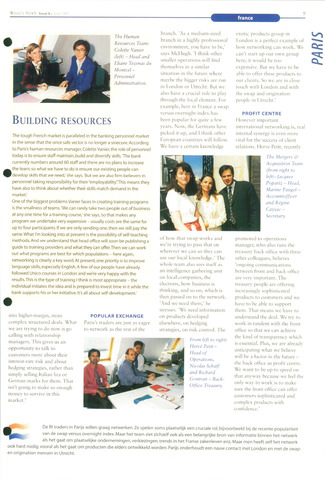Building resources
What's NewS Issue 6 June 1997
france
9
The tough French market is paralleled in the banking personnel market
in the sense that the once safe sector is no longer a sinecure. According
to Paris's human resources manager, Colette Vanier, the role of personnel
today is to ensure staff maintain, build and diversify skills. The bank
currently numbers around 60 staff and there are no plans to increase
the team, so what we have to do is ensure our existing people can
'develop skills that we need,' she says. 'But we are also firm believers in
personnel taking responsibility for their "employability'This means they
have also to think about whether their skills match demand in the
market.'
One of the biggest problems Vanier faces in creating training programs
is the smallness of teams. 'We can rarely take two people out of business
at any one time for a training course/she says, 'so that makes any
program we undertake very expensive - usually costs are the same for
up to four participants.lf we are only sending one,then we still pay the
same. What l'm looking into at present is the possibility of self-teaching
methods. And we understand that head office will soon be publishing a
guide to training providers and what they can offer.Then we can work
out what programs are best for which populations - here again,
networking is clearly a key word. At present, one priority is to improve
language skills, especially English. A few of our people have already
followed Unico courses in London and we're very happy with the
results.This is the type of training I think is most appropriate - the
individual initiates the idea and is prepared to invest time in it while the
bank supports his or her initiative. It's all about self-development.'
branch. 'As a medium-sized
branch in a highly professional
environment, you have to be,'
says McHugh. 'I think other
smaller operations will find
themselves in a similar
situation in the future where
maybe the bigger risks are run
in London or Utrecht. But we
also have a crucial role to play
through the local element. For
example, here in France a swap
versus overnight index has
been popular for quite a few
years. Now, the Germans have
picked it up, and 1 think other
European countries will follow.
We have a certain knowledge
promoted to operations
manager, who also runs the
treasury back office with three
other colleagues, believes
'ongoing Communications
between front and back office
are very important. The
treasury people are offering
increasingly sophisticated
products to customers and we
have to be able to support
them. That means we have to
understand the deal. We try to
work in tandem with the front
office so that we can achieve
the kind of transparency which
is essential. Plus, we are already
anticipating what we believe
will be a factor in the future -
the back office as profit centre.
We want to be up to speed on
that anyway because we feel the
only way to work is to make
sure the front office can offer
customers sophisticated and
complex products with
confidence.'
The Human
Resources Team:
Colette Vanier
(left) - Head and
Eliane Tezenas du
Montcel -
Personnel
Administration.
into higher-margin, more
complex structured deals. What
we are trying to do now is go
calling with relationship
managers. This gives us an
opportunity to talk to
customers more about their
interest-rate risk and about
hedging strategies, rather than
simply selling Italian lira or
German marks for them. That
isn't going to make us enough
money to survive in this
market.'
POPULAR EXCHANGE
Paris's traders are just as eager
to network as the rest of the
exotic products group in
London is a perfect example of
how networking can work. We
can't start up our own group
here; it would be too
expensive. But we have to be
able to offer these products to
our clients. So we are in close
touch with London and with
the swap and origination
people in Utrecht.'
PROFIT CENTRE
However important
international networking is, real
internal synergy is even more
vital for the success of cliënt
relations. Fierve Petit, recently
The Mergers
Acquisition Team
(from right to
left): Jacques
Popartz - Head,
Marine Pauget -
Accountofficer
and Régine
Cayzac -
Secretary.
of how that swap works and
we're trying to pass that on
wherever we can so they can
use our local knowledge.' The
whole team also sees itself as
an intelligence gathering unit
on local companies, the
elections, how business is
thinking, and so on, which is
then passed on to the network.
'And we need them,' he
stresses. 'We need information
on products developed
elsewhere, on hedging
strategies, on risk control. The
From left to right:
Hervé Petit -
Head of
Operations,
Nicolas Schaff
and Richard
Gontran - Back
Office Treasury.
De Rl traders in Parijs willen graag netwerken. Ze spelen soms plaatselijk een cruciale rol, bijvoorbeeld bij de recente populariteit
van de swap versus overnight index. Maar het team ziet zichzelf ook als een belangrijke bron van informatie binnen het netwerk
als het gaat om plaatselijke ondernemingen, verkiezingen, trends in het Franse zakenleven enz. Maar men heeft zelf het netwerk
ook hard nodig, vooral als het gaat om producten die elders ontwikkeld worden. Parijs onderhoudt een nauw contact met London en met de swap-
en origination mensen in Utrecht.

